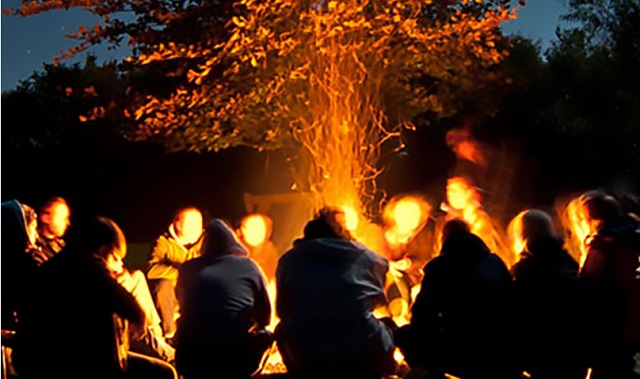
Ancient fireside gatherings could tackle stigma
| BONNIE FOURNIER | For 25 years, northern Uganda was devastated by civil war. During this time the area’s residents, many of whom belong to the Acholi people, were forced from their homes. They ended up living in internally displaced camps, relying on the World Food Programme and battling a severe shortage of clean water. Hunger, malnutrition and a lack of adequate sanitation facilities took a dreadful toll.
Death rates rose significantly next to the national average rate. Survival was the only priority. As such, many of the Acholi’s traditional practices were eroded.
One of these practices was the gathering around the wang-oo, a central, communal fireplace where elements of the culture – stories, songs, riddles and parables – were told and passed on from one generation to another.
The wang-oo usually happened in the evenings. It served as entertainment, moral education and conflict resolution. It was also a sort of informal school for the Acholi. There, information on taboos, rituals and expected behaviour was passed on. Elders used the time to indirectly correct community members’ misbehaviour’s by relating proverbs and folk tales.
Without a formal space to bind the community in the midst of serious social problems in the camps, the status of elders was severely undermined and the continuity of traditional values from one generation to the next ceased to exist. When people began to return to their communities a decade ago during relative peace, many of the traditional practices, such as the wang-oo, were not re-established.
Now, researchers, Acholi elders, and teachers are working to together to revitalise the wang-oo. Our plan is to bring the practice into schools in a new way: by using it as a space where young people can discuss HIV and the stigma surrounding the condition.
Addressing HIV stigma through using the Acholi’s own local cultural system is an empowering process that will position the role of the elders back into the community. It will also provide a valuable space for vulnerable young people to talk openly about HIV and stigma and to learn folktales that support respect and responsibility.
Tackling stigma
Adolescents in sub-Saharan Africa account for 71% of new infections every year.
While antiretroviral therapy is preserving health and prolonging life, stigma continues to cripple individuals and communities. My previous research, also conducted in Uganda, has shown that adolescents with HIV face discrimination and bullying in school and in the broader community. This can lead to social isolation, school drop-out, depression and suicide.
To address these issues, we are drawing from the teachings that traditionally take place around the wang-oo. These demonstrate empowering concepts related to self and community, respect for self, peers and authority, and responsibility for caring for others. And it’s these concepts that will provide the inputs for our four-year research project intervention to decrease HIV stigma among school children, teachers and the broader community.
During my previous work in Uganda, living and working in the country for several years, I learned about the many traditional practices that were helping to reintegrate children who had been abducted during the quarter century of civil war back into their communities. I wondered how other Acholi traditional practices could support children in addressing issues such as HIV stigma.
Some members of our research team have just returned from Uganda where we learnt that elders are very much interested in reestablishing their role. However, more work needs to be done with older youth to create interest. Integrating the project into schools and using creative methods will make learning more formalised, fun, and engaging for youth.
The idea is that this approach will be grounded in local cultural knowledge. Project activities include using visual art (painting, sketching), dance, singing, and theatre to change social and cultural norms, and directly address various types of stigma. Family, community members, and health care workers will be invited to weekly performance events.
These events, similar to the wang-oo, will bring together diverse groups of people to discuss HIV stigma and to participate in re-creating new behaviours and attitudes that demonstrate their moral teachings passed on by elders. The hope is that while not the wang-oo in its traditional form, a more modern form will emerge, making the traditional practice more appealing.
Restoring cultural values
The restoration of cultural practices and values will need long term effort and multiple strategies happening at the same time for sustained change. One such strategy happening in northern Uganda is a radio programme that airs every Saturday evening with local traditional stories, parables and riddles told by Elders. Individuals are encouraged to call into the show and guess the moral teaching.
There are other efforts underway to document traditional knowledge by video recording elders as a way to capture the oral history of the Acholi people.
Bringing people together through theatre, radio, or video in a similar way as the wang-oo has the potential to promote healing and build resiliency in a society that has lost so much. Addressing HIV stigma through local cultural knowledge will support families and communities to help children become healthy productive citizens.
****
Bonnie Fournier is Associate Professor, Thompson Rivers University
 The Independent Uganda: You get the Truth we Pay the Price
The Independent Uganda: You get the Truth we Pay the Price


